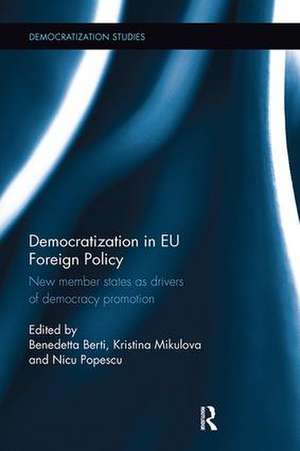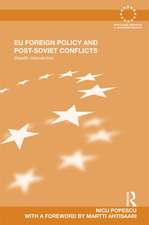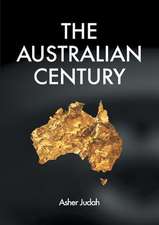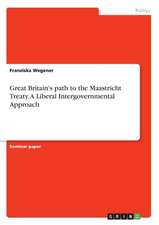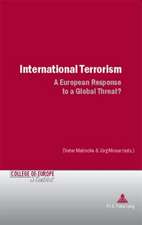Democratization in EU Foreign Policy: New member states as drivers of democracy promotion: Democratization and Autocratization Studies
Editat de Benedetta Berti, Kristina Mikulova, Nicu Popescuen Limba Engleză Paperback – 16 iun 2017
This book examines the attempts of one group of young democracies, from Central and Eastern Europe (CEE), to channel this pro-democracy agenda into both national and European foreign policy and development support. It looks at how CEE is ‘upstream’ changing the EU on crucial policy issues as part of the common foreign and security policy. Furthermore, it tracks the process whereby imported ideas and norms are recycled for further export ‘downstream’, and how these concepts are received in countries outside of the EU including the post-Soviet space, the Western Balkans, the Middle East and North Africa region and Central Asia.
This text will be of key interest to scholars, students and practitioners of democratisation studies, European Union studies, comparative politics, international relations, international development, European politics, as well as area/regional studies.
| Toate formatele și edițiile | Preț | Express |
|---|---|---|
| Paperback (1) | 440.39 lei 43-57 zile | |
| Taylor & Francis – 16 iun 2017 | 440.39 lei 43-57 zile | |
| Hardback (1) | 1086.70 lei 43-57 zile | |
| Taylor & Francis – oct 2015 | 1086.70 lei 43-57 zile |
Din seria Democratization and Autocratization Studies
-
 Preț: 310.08 lei
Preț: 310.08 lei -
 Preț: 369.08 lei
Preț: 369.08 lei -
 Preț: 311.41 lei
Preț: 311.41 lei -
 Preț: 288.88 lei
Preț: 288.88 lei -
 Preț: 280.94 lei
Preț: 280.94 lei -
 Preț: 303.50 lei
Preț: 303.50 lei -
 Preț: 338.76 lei
Preț: 338.76 lei - 26%
 Preț: 761.80 lei
Preț: 761.80 lei - 18%
 Preț: 1036.31 lei
Preț: 1036.31 lei - 12%
 Preț: 340.88 lei
Preț: 340.88 lei -
 Preț: 406.74 lei
Preț: 406.74 lei - 13%
 Preț: 324.85 lei
Preț: 324.85 lei -
 Preț: 454.93 lei
Preț: 454.93 lei - 18%
 Preț: 981.53 lei
Preț: 981.53 lei -
 Preț: 407.85 lei
Preț: 407.85 lei -
 Preț: 316.76 lei
Preț: 316.76 lei - 13%
 Preț: 335.92 lei
Preț: 335.92 lei - 18%
 Preț: 985.86 lei
Preț: 985.86 lei - 26%
 Preț: 763.82 lei
Preț: 763.82 lei - 17%
 Preț: 243.61 lei
Preț: 243.61 lei -
 Preț: 407.85 lei
Preț: 407.85 lei - 22%
 Preț: 298.17 lei
Preț: 298.17 lei - 26%
 Preț: 819.48 lei
Preț: 819.48 lei - 18%
 Preț: 1037.34 lei
Preț: 1037.34 lei - 18%
 Preț: 692.79 lei
Preț: 692.79 lei - 49%
 Preț: 545.82 lei
Preț: 545.82 lei - 26%
 Preț: 850.68 lei
Preț: 850.68 lei - 13%
 Preț: 324.85 lei
Preț: 324.85 lei - 16%
 Preț: 248.99 lei
Preț: 248.99 lei -
 Preț: 381.83 lei
Preț: 381.83 lei -
 Preț: 401.24 lei
Preț: 401.24 lei - 13%
 Preț: 337.54 lei
Preț: 337.54 lei - 18%
 Preț: 980.61 lei
Preț: 980.61 lei - 18%
 Preț: 1090.69 lei
Preț: 1090.69 lei
Preț: 440.39 lei
Nou
Puncte Express: 661
Preț estimativ în valută:
84.28€ • 87.55$ • 70.01£
84.28€ • 87.55$ • 70.01£
Carte tipărită la comandă
Livrare economică 03-17 februarie 25
Preluare comenzi: 021 569.72.76
Specificații
ISBN-13: 9781138309890
ISBN-10: 1138309893
Pagini: 224
Ilustrații: 2
Dimensiuni: 156 x 234 x 12 mm
Greutate: 0.45 kg
Ediția:1
Editura: Taylor & Francis
Colecția Routledge
Seria Democratization and Autocratization Studies
Locul publicării:Oxford, United Kingdom
ISBN-10: 1138309893
Pagini: 224
Ilustrații: 2
Dimensiuni: 156 x 234 x 12 mm
Greutate: 0.45 kg
Ediția:1
Editura: Taylor & Francis
Colecția Routledge
Seria Democratization and Autocratization Studies
Locul publicării:Oxford, United Kingdom
Public țintă
PostgraduateCuprins
Part 1 Theory and Overview 1 Introduction Kristina Mikulova and Nicu Popescu 2 Trade, Freedom or Trading Freedom? How Strategic and Normative Interests Shape Foreign Policy and Democracy Assistance in Central and Eastern Europe Tsveta Petrova and Michal Simecka Part 2 CEE and the EU 3 CEE Transition Experience in EU Development Policy: Democratization of Europe’s Development Agenda Simon Lightfoot and Balázs Szent Iványi 4 Central and East European EU Member States’ Impact on the EU’s Democracy Promotion Policy Towards Central Asia Fabienne Bossuyt 5 From the ‘Coloured Revolutions’ in the Post-Soviet Space to the Arab Awakening: EU Approaches to Democracy Promotion and the Rising Influence of CEE States Benedetta Berti and Ola Onuch 6 The European Endowment for Democracy: a case of ‘Central Europeanization’ of EU democratization policies? David Cadier and Kristina Mikulova Part 3 Case studies of Democracy Assistance in Third Countries 7 Exporting Post-Communist Experience Eastwards: The Case of Post-Soviet Defence and Local Government Reform Michal Simecka 8 Converts to Missionaries: Central and East European Democracy Assistance in the Arab World Benedetta Berti and Kristina Mikulova 9 Subtle Europeanizers: Czech and Slovak Support for the European Integration of the Western Balkans Jessie Hronesova 10 Conclusion Benedetta Berti and Nicu Popescu
Notă biografică
Benedetta Berti is a Fellow at the Institute for National Security Studies and a Kreitman Post-Doctoral Fellow at Ben Gurion University. Her research focuses on post-conflict stabilization, democratization, political participation of armed groups, with a special emphasis on the Middle East
Kristina Mikulová is a research fellow at Comenius University in Bratislava and the Head of Development Cooperation Unit at the Finance Ministry of the Slovak Republic. She has also worked as a freelance consultant for The World Bank, UNDP and Oxford Analytica. Kristina holds a doctorate (D.Phil. in Politics and International Relations from Nuffield College, Oxford University, and a master's (M.Phil. degree in Russian and East European Studies from St. Antony's College, Oxford University. Kristina previously worked as a reporter at various media outlets, including The Economist, the Financial Times' editorial office in Prague, and The Moscow Times in Moscow.
Nicu Popescu is Senior Analyst at the EU Institute for Security Studies in Paris. He previously worked as advisor on foreign policy and EU affairs for the prime minister of Moldova (2010, 2012-2013), head of programme and senior research fellow at the European Council on Foreign Relations in London (2007-2009, 2011-2012), and as a research fellow at the Centre for European Policy Studies in Brussels (2005-2007). He holds a PhD in International Relations from the Central European University in Budapest, Hungary.
Kristina Mikulová is a research fellow at Comenius University in Bratislava and the Head of Development Cooperation Unit at the Finance Ministry of the Slovak Republic. She has also worked as a freelance consultant for The World Bank, UNDP and Oxford Analytica. Kristina holds a doctorate (D.Phil. in Politics and International Relations from Nuffield College, Oxford University, and a master's (M.Phil. degree in Russian and East European Studies from St. Antony's College, Oxford University. Kristina previously worked as a reporter at various media outlets, including The Economist, the Financial Times' editorial office in Prague, and The Moscow Times in Moscow.
Nicu Popescu is Senior Analyst at the EU Institute for Security Studies in Paris. He previously worked as advisor on foreign policy and EU affairs for the prime minister of Moldova (2010, 2012-2013), head of programme and senior research fellow at the European Council on Foreign Relations in London (2007-2009, 2011-2012), and as a research fellow at the Centre for European Policy Studies in Brussels (2005-2007). He holds a PhD in International Relations from the Central European University in Budapest, Hungary.
Recenzii
This book is timely and useful. It recognizes and appreciates the role of the new(er) EU member states in defining and determining the foreign policy of the Union. Their own rich and complex experience with transformation, consolidation and modernization after a long period of totalitarianism provides the primary motivation for helping and assisting others in their struggle for democratic, stable, predictable and prosperous societies. I would like to commend the authors for their efforts, which will certainly help students, scholars and all those who are interested in our part of Europe and this particular part of our history to deepen their understanding. - Miroslav Lajčák, Deputy Prime Minister Minister and Minister of Foreign and European Affairs of the Slovak Republic
Descriere
This book examines the attempts of one group of young democracies, from Central and Eastern Europe (CEE), to channel this pro-democracy agenda into both national and European foreign policy and development support. It looks at how CEE is ‘upstream’ changing the EU on crucial policy issues as part of the common foreign and security policy. Furthermore, it tracks the process whereby imported ideas and norms are recycled for further export ‘downstream’, and how these concepts are received in countries outside of the EU including the post-Soviet space, the Western Balkans, the Middle East and North Africa region and Central Asia.
